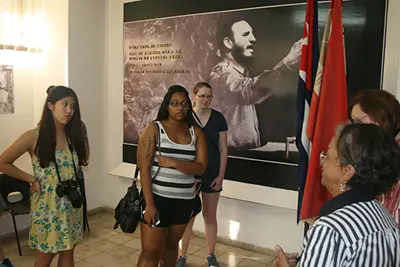New 'World Ready' Track Offers Students More Flexibility
 Image by Moniphal Bing
Image by Moniphal Bing
10/27/2016
By Katharine Webster
David Rouisse was a history major planning on a law career when he started taking French classes to meet his language requirement in the College of Fine Arts, Humanities and Social Sciences (FAHSS).
He enjoyed his classes so much that he’s switching his major to French, with a minor in history.
He’s planning to spend spring semester abroad, living with a family in Grenoble, France, and studying French intensively. This semester, he’s tutoring children at Ste. Jeanne d’Arc Elementary School in Lowell through a service-learning option in his French 4 class — an experience so rewarding that he’s thinking of becoming an ESL teacher.
“I realized I can share my experience with other people,” he says. “The kids are starting to make connections between language and understanding.”
Rouisse, a junior from Hardwick, chatted at a recent event hosted by the World Languages and Cultures Department, the International Experiences & Study Abroad office and the Centers for Learning and Academic Services, which has at least one student tutor in each language the university offers: Arabic, Cambodian (Khmer), Mandarin, French, German, Italian, Portuguese, Spanish and Latin translation.
The expansion of faculty-led study abroad programs and a new “World Ready” language and culture track for FAHSS majors are making it easier and more enjoyable for students to meet their language requirement, says World Languages and Cultures Department chairwoman and Assoc. Prof. Carole Salmon. And some students, like Rouisse, are discovering a real love for languages.
 Image by Julian Zabalbeascoa
Image by Julian Zabalbeascoa
Students in most FAHSS majors who entered the university before fall of 2015 have to take (or test out of) four semesters of a foreign language to reach intermediate proficiency.
But starting last year, entering students can choose between the traditional “World Language” track and the new “World Ready” track: two semesters of a foreign language and three classes about culture related to the same language. For example, students can take Italian 1 and 2, an English class on Fellini’s films, a history class on Italy’s role in World War II and an art history class on Italian Renaissance painting.
“Language classes have to be taken in sequence, but culture classes can be taken anytime. With the World Ready track, students can take language and culture courses in the same semester,” says Salmon, who co-leads a summer study abroad program in Paris on French cinema and modernism with art history lecturer Jennifer Cadero-Gillette.
Douglas Cooper, coordinator of retention initiatives in the Centers for Learning and Academic Support Services, says the new track is especially helpful for transfer students as well as students who switch from a non-FAHSS major like nursing or business to a FAHSS major, such as philosophy or political science.
“Sometimes students tense up when they suddenly discover there’s a language requirement,” he says. “This option makes it less daunting and gives them more flexibility to complete their degree on time.”
Faculty-led study abroad trips in France, Portugal, Italy and Spain also help students fulfill language or culture requirements. Students taking three or six weeks of a Spanish immersion course in Cádiz, Spain, can earn six or 12 language credits and an optional three credits for a culture class. Honors students can study Spanish language and culture simultaneously for three weeks in San Sebastian, Spain.
Salmon also works individually with students like Rouisse who are studying abroad for a semester to help them figure out which courses will meet which requirements — for language, culture, general education and their major.
Because of the college’s commitment to experiential learning, the FAHSS dean’s office and most departments offer modest scholarships to defray the price of airfare, which makes the cost per credit of the study abroad programs close to that of on-campus classes.
Of course, languages aren’t just for FAHSS majors. Christina Galluccio, an honors nursing major from Newport Beach, Calif., added a second major in Spanish last spring. She’s already used the language in her first clinical placement this fall at North Shore Hospital in Salem, where about half of her young patients or their parents were immigrants who spoke only Spanish.
“I felt it was really important as a nurse — or anyone in America, actually — to speak Spanish,” she says.
Anirudh Cherukat, a first-year chemical engineering student from Franklin, says he just enjoys learning French, thanks to a high school teacher, and hopes to continue. Meanwhile, he will join the campus French club so he can practice.
“I just fell in love with the language,” he says.



